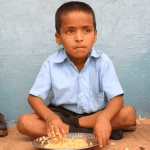Chickens Are an Overlooked Risk to Child Health: Here’s Why We Have to Get Poultry Promotion Right
In 2016, Bill Gates wrote, “It’s pretty clear to me that just about anyone who’s living in extreme poverty is better off if they have chickens.” Gates listed a number of valuable traits particular to poultry, including the ease and low cost of their care, the nutritional value of eggs, the potential for increasing women’s economic asset base and the economic value of the chickens and the eggs they produce. As Gates pointed out, chickens can be a good business investment: A household can start with five hens and a rooster, and after three months, they can have a flock of 40 chicks. This size flock can provide critical nutrition as well as critical income for households living in or near extreme poverty.
In rural Uganda, The Water Trust has found evidence that all of these benefits are (or at least can be) true with appropriate training and support.
But we have also found that chickens pose a significant threat to children’s health. In a recent article in The American Journal of Tropical Medicine and Hygiene, we share results from a household survey in western Uganda that found that children in households with a greater than average number of chickens had an 83% higher diarrhea prevalence than those with less than the average number. This strong association is maintained when you control for many factors that might influence child health (like sanitation practices and household wealth, among others.)
A Resource and A Risk
This was not a result we expected. As a water, sanitation and hygiene organization, we have not focused on animals. Our motivation for this study was to understand whether our hygiene promotion had different effects on poorer and wealthier households. Only when analyzing the data did we notice that many wealthier households with more chickens actually had worse health outcomes and more visible feces in their compound.
This finding is part of a growing evidence base that the presence of animals in general (and poultry in particular), may explain why efforts to improve water, sanitation and hygiene have not translated into child health improvements.
In rural Uganda, chickens pose a particular threat to child health because they often roam freely around the compound during the day, and even sleep in the living quarters at night. Their small feces is considered relatively innocuous and in turn largely ignored. As a result, the dirt in which children often sit – and which they may put in their mouths – can be significantly contaminated with chicken feces.
The solution may seem obvious — tell households to corral their chickens. Yet a study in a peri-urban environment in Peru found that households with corrals actually saw an increase in diarrheal risk in children compared to households with free-range chickens. This may have been due to the close proximity of the corrals to the children, given the limited land available in a peri-urban setting. Alternatively, it may have been due to the poor hygiene practices of the people in the households who entered and cleaned the corrals, or due to children entering the corral areas.
Another obstacle to this solution is that households may be reluctant to corral their chickens, as corrals both cost money, and require a number of other behavior changes, such as feed preparation or purchase, corral cleaning, and immunization against diseases that spread quickly among chickens in closer quarters.
Hygiene Training = Better Health
To help overcome these challenges, last year The Water Trust received a grant from the Pace Family Foundation to train some of our hygiene promotion staff on poultry management. The grant allowed us to begin some small-scale community consultations and trainings, with the aim of identifying an effective approach to improve the hygiene of poultry management in rural Uganda.
Shortly after, we also received a grant from the United States Agency for International Development (USAID) as part of the Water, Sanitation and Hygiene Partnerships and Learning for Sustainability (WASHPaLS) project. The project aims to develop a formal training program for poultry management, and to evaluate its impact with a randomized controlled trial across 51 treatment and 49 control communities. The research is being led by Dr. Angela Harris and Dr. Ayse Ercumen of North Carolina State University. At the moment, we are midway through implementation of this grant, with results expected toward the end of 2020. (This timing may be affected by the COVID-19 crisis, which is currently delaying coaching activities.)
Our hypothesis is that we can increase the adoption of hygienic management practices by emphasizing both the child health and livelihood benefits of more proactive poultry management. Many management practices (such as improved feed, immunizations and cleaning up feces) do indeed have benefits for both chickens and children.
Our training program begins with an initial triggering activity designed to raise awareness of chicken feces as a health risk, and the potential economic benefits of more proactive management. A three-day training program then provides practical skill-building activities (e.g., building a chicken coop, and mixing chicken feed from local crops) and advice on how to address community concerns (e.g., theft and disease.)
We also encourage and support community members with poultry experience to mentor their neighbors, and we visit each community monthly for four to five months to help troubleshoot problems and offer encouragement and support. Importantly, our training program targets the savings groups (which we call “self-help groups”) which we had previously formed to finance repairs for these communities’ shared water points. These groups meet weekly, and offer an efficient platform for group trainings and follow-up.
Getting It Right
It is too early to tell whether our approach will be effective. It is possible that additional financial support (e.g., an asset transfer or external loan) may be necessary to address the capital constraints that prevent people from making improvements to their poultry management practices. It is also possible that our encouragement of more proactive poultry management may unintentionally make the contamination problem worse, by increasing the number of chickens that households maintain without improving their hygiene.
What is clear is that we need more attention and investment in improving the hygienic management of chickens. For all the reasons enumerated by Bill Gates, the potential of chickens to improve the economic well-being, nutrition and gender equality of rural households is significant. The growing evidence of the negative impact of chickens on child health only increases the importance of getting poultry promotion right.
Join The Water Trust for a webinar on June 10 at 9 am EST for more information on poultry and health and the pilot program currently underway. You can register here.
This research is made possible by the support of the American People through the United States Agency for International Development (USAID). The contents of this article are the sole responsibility of The Water Trust and do not necessarily reflect the views of USAID or the United States Government.
Chris Prottas is Executive Director of the Water Trust.
Photo courtesy of organization.
- Categories
- Agriculture, Health Care, WASH



